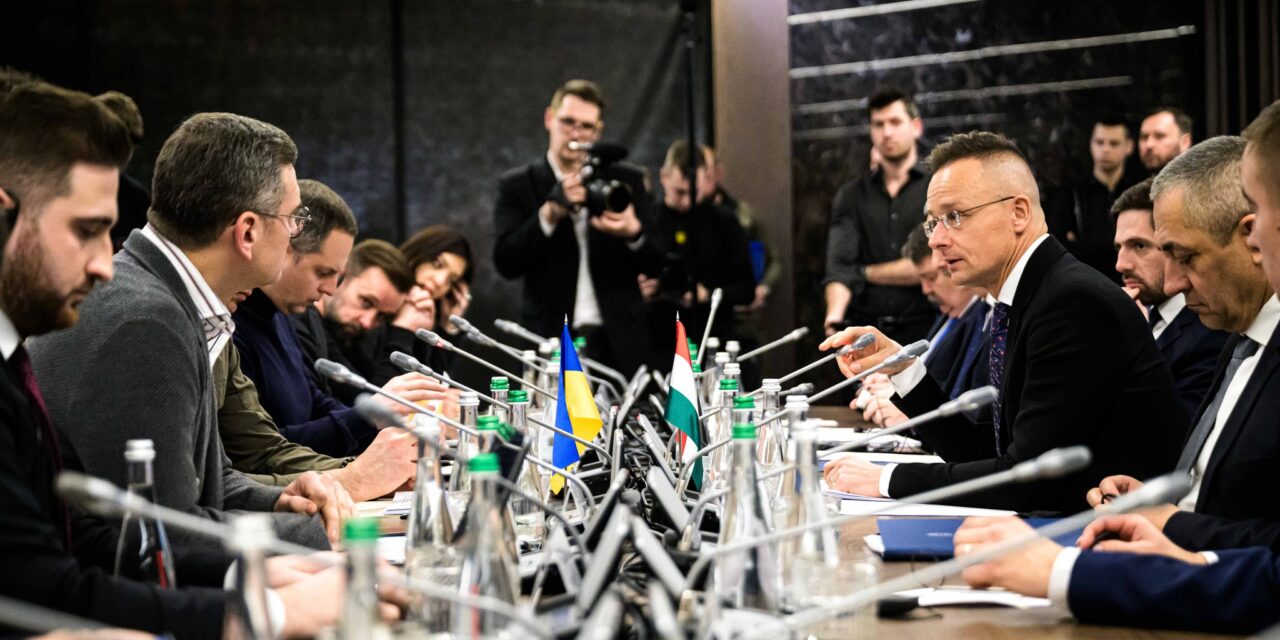It is not known how long Zelensky will remain in power, after all, there is not a week that does not go by without silk strings from overseas.
Ukraine is one of the big three hotbeds of global war, but it is now the priority for the globalist elite. They are preparing for a protracted fight and would finance the war in Ukraine with the Europeans for four more years. Within the Western bloc, Hungary's pro-peace and sanctions-critical position is still in the minority among the member countries, but it has already become a relative majority in the war and sanctions-weary public opinion of the Western countries.
The Hungarian government rightly suggested that bilateral meetings only make sense if they bring concrete results. The question is, who is it worth negotiating with on the Ukrainian side?
It is not known how long Zelensky will remain in power, after all, there is not a week that he does not receive silk strings from overseas.
It recently emerged that he could have made peace as early as March 2022 on much better terms than today, if he had not listened to then-British Prime Minister Boris Johnson. Zelenskiy banned peace negotiations with Moscow in a presidential decree, so if they were to negotiate on the Ukrainian side, the president would either withdraw his own decree or resign. The latest debate is whether the newly established army will be used for attack or defense? Zelensky would attack again, the Anglo-Saxons would defend. The two do not work at the same time, so Zelenskiy can get the short end of the stick here as well, as more and more details of his family fortune are revealed, from his mother-in-law's villa in Egypt to his wife's luxury purchases.
Bilateral relations are mostly burdened by the disenfranchisement of the Hungarian minority, which follows from the Ukrainian nation-building after 2014. Five years ago, Zelensky was elected by Russian-speaking voters in eastern Ukraine precisely because he promised to slow down the Ukrainization initiated by President Poroshenko and to settle the relationship with Russia. Since then, a lot of water has flowed down the Dnieper, and the situation of the minorities living in Ukraine has only worsened. The standard is the liberal Ukrainian constitution, which is still alive, which the education and language laws have already contradicted, and the planned changes to the minority law did not promise much good either. Instead of guaranteeing minority rights, they would have even amended the constitution.
The fact that the disenfranchisement of the Transcarpathian Hungarian minority is a "collateral loss" of the assimilation of the Russian minority in Ukraine does not improve the situation either.
We only mention tangentially that processes similar to the disenfranchisement of Russians in Ukraine have started against Russians living in the Baltics, which does not bode well for the future. The Hungarian government made several specific proposals to Kiev to resolve the situation, such as the exclusion of church and foundation-maintained schools from the scope of the education law, after all, with the support of the Hungarian state, countless Hungarian kindergartens, schools and colleges in Transcarpathia were renovated. Another option was to exclude the minorities of the EU and NATO member states, but Kiev did not accept this either. Due to the lack of good intentions, Budapest had no choice but to demand the restoration of the state before the deprivation of rights. It is not an argument that Transcarpathian Hungarians must also "learn the state language". After all, they have been living in the fourth state structure since Trianon, and in a hundred years they have managed somehow with alternating state languages, so they have acquired rights.
It is not "deserved" that Kiev gave in at the last moment in December 2023 and refined the laws that curtail the rights of minorities, not voluntarily, but seeing the Hungarian government's consistent stance.
Because of this, the spectacular and quiet Ukrainization continues, and the turul does not return to the face of Münkacsi Castle, or they do not stop replacing the heads of Hungarian schools and forcing Ukrainian (language) classes. The Hungarian anthem and flag remain banned and it does not appear that the administrative and electoral machinations are not carried out at the expense of Hungarianness. In Romania, it is not expected that the new regions will be formed before the election, so if Ukraine is thinking about such a thing, it would be advisable to consult with the representatives of the Transcarpathian Hungarians and Budapest for the sake of good neighborly relations. Of course, for this, Hungarian politicians and companies should first be removed from the death lists and sanctions registers. In a country trying to join the EU, they don't drive such cars.
Improving transport links is a mutual interest. When the Polish and Slovak farmers and carriers closed their own borders, the Ukrainians went through Hungary.
Since this could happen again at any time, the highways of the two countries should be connected and the railway connection should be improved. Slovak Prime Minister Fico has just signed an agreement for the development of the broad-gauge railway line left from Soviet times to Kassa. It is also necessary to clarify the issue of Ukrainian grain transit, which was allowed by the EU on the condition that it only passes through the "solidarity corridors" and is not sold in the Union. The original agreement should also remain with the Ukrainian carriers, who can transport goods between the member countries and Ukraine, but cannot undertake transport between the member countries.
Transport and transit include the Friendship pipeline, the uninterrupted operation of which is of mutual interest. After the Hungarian government fought for the exemption, it would be good if the Ukrainians would take care of it, still avoiding the case of November 2022, when debris from anti-aircraft missiles not only killed two Polish farmers, but also "accidentally" damaged a substation of the Barátság oil pipeline. The damage was quickly repaired with Hungarian help, and since then the Ukrainians have been paying more attention. We hope the same will remain true for the Russian gas pipelines running under the Black Sea that also supply Hungary, which will not be blown up by Ukrainian hobbyist partisans with similar sufnituning methods, as three of the four pipes of the Nord Stream 1 and 2 gas pipelines.
A pipeline can not only be blown up, but can also be harmed by skyrocketing the transit fee, as the Croatians and Bulgarians tried to do, abusing their status as a transit country.
The Bulgarian rainbow coalition was quickly brought to a better understanding by reminding them of the Schengen membership, in the case of the Croatians, it is expected that a court will have to examine the justification of the transit fee increase, which is well above inflation. It is good if the Ukrainians see the determination of the Hungarian government to ensure the energy supply of the domestic population and industry and shape their policy accordingly.
Hungary - similarly to Austria and the Czech Republic - has declared that it will not extradite the conscripted Ukrainian men to Kiev, so if the Baltic and Scandinavian countries, as well as Poland and Germany - in a strictly "rule of law" procedure - later actually decide against extradition at Kiev's request, then Ukrainian men fleeing the meat grinder will predictably flee to these countries.
Ukrainian-Hungarian relations are currently at a low point because of Kiev, so the Ukrainian side must also start building trust. Reversing the deprivation of rights of the Hungarian minority is indirectly good for all minorities in Ukraine, so once again the sovereignist Hungarian government is scraping the chestnuts of the other neighboring countries as well. As long as there is no concrete realization of the declarations from the Ukrainian side, it is good if Budapest has such tough guarantees as the annual review of the EU loan intended for Ukraine.
Featured image: The Hungarian and Ukrainian negotiating delegation at work. Source: Facebook/Péter Szijjártó












